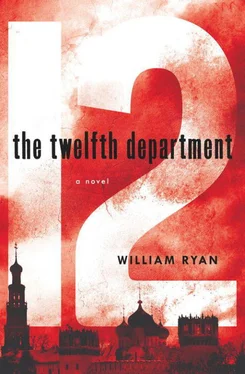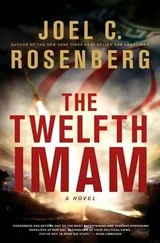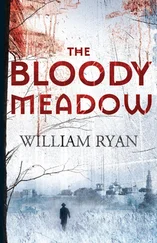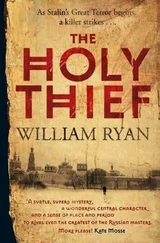“He knows I deal with hardened criminals—maybe he thought men coming to the door with guns in the middle of the night were bandits.”
Korolev wasn’t surprised to find his voice was a little distorted—he rolled his jaw around. He didn’t think it was broken. Just bruised—like most of his body. But the fat lip that went with it probably wasn’t helping his pronunciation.
“Are you suggesting the operatives that went to collect you from Babel’s dacha looked like bandits? Respected members of State Security?” Rodinov said, finally lifting his gaze to examine Korolev.
“Well they certainly didn’t look like ballerinas, Comrade Colonel.”
Rodinov considered him for a moment, his face impassive. Korolev had a suspicion he looked as if he’d been used as a punchbag by a pair of heavyweight boxers—and it wasn’t far from the truth. A nurse had cleaned him up when he’d arrived but even so he’d a fat lip, plenty of cuts, bumps and grazes, his shirt was splattered with dried blood and he could barely see out of his left eye. At least he hadn’t lost any teeth.
“I see,” Rodinov said. “Their orders were just to bring you in. Still, it says here you resisted our people.”
“I didn’t want to leave my twelve-year-old son wandering around the woods in the middle of the night. I wanted to find him before we left. If that counts as resisting, then I resisted.”
Korolev spoke in a monotone—he was tired, it was just past two in the morning and there wasn’t much of him that didn’t hurt.
“He shouldn’t have run,” Rodinov said. “You knew who they were, after all.”
“I’ve met members of State Security before. He’s only a boy.”
“And now he’s a missing boy.”
Korolev had nothing to say to that. Yuri had been with him for three days and somehow he’d managed to lose him and end up in the Lubyanka.
“Well, I’ll ask Popov to make sure the local Militia start looking for him first thing,” Rodinov said, signing a page that was stapled to the inside of the file’s cardboard cover. “I’m sure they’ll track him down soon enough. Anyway, it’s time we got to the point.”
Rodinov closed the file and placed his pen down on top of it, turning his full attention to Korolev.
“We’ll start with you telling me why you carried on with your investigation into Professor Azarov’s death when you were given explicit orders not to.”
Korolev could feel his mouth go slack with astonishment. Or as slack as it could go, given the damage that had been inflicted on it.
“But I didn’t. As soon as we were told to drop the matter, we dropped it. Like a hot potato, believe me. I wanted nothing to do with the investigation once I knew it was State Security, I swear it on my mother’s grave.”
Rodinov had had a hard year by the look of him. Korolev had first met him not twelve months before, and back then he’d had a healthy sheen to his skin and seemed solid and full of energy. Now, despite a summer that had turned most Muscovites dark as Abyssinians, the colonel had the gray pallor of a prisoner—his cheeks were drawn and his tunic seemed too big for him. Whatever kind of work he was doing these days, and Korolev most certainly didn’t want to know what that might be, it looked as if it didn’t take him outside very often.
“It’s known what you were up to in Peredelkino, Korolev. What did you think? That you could go around questioning people without State Security hearing about it? And what did you hope to achieve by it? You knew this was a secret matter. Did you hope to pass information to the State’s enemies?”
Korolev ran his tongue over his fat lip and shook his head, both in disagreement and in bewilderment.
“I spoke to no one in Peredelkino, Comrade Colonel. The caretaker, Lipski, of course—but, apart from him, no one.”
“No one, is it?” Rodinov said. “No one? I have on my desk a report, submitted only a matter of hours ago, that says differently.”
Rodinov opened a thick green folder and extracted a typed piece of paper.
“It says here you were seen talking to a number of people who have a clear connection with Professor Azarov’s work. I’d like to know why.”
Korolev thought back—he’d spoken to the ticket collector at the station. Apart from her, he couldn’t remember anyone else. Except for Kim Goldstein, of course. He frowned.
“There was one of the boys at the river—they were out from some orphanage in the city for a few days, I think. A youngster by the name of Goldstein—but I knew him from before.”
Rodinov said nothing, giving Korolev the distinct impression that Goldstein was exactly who he’d been referring to.
“I spoke to him,” Korolev said. “But I’d no idea he was connected with Azarov.”
“And the others?”
“I spoke to no one else.”
“Your son did.”
“He went swimming with Goldstein is all. But Goldstein was the boy who assisted on that matter last year—the icon affair. You’ll recall he provided useful information.”
Rodinov considered this, tapping his pencil against his chin as he did so.
“And what did you speak to him about, this time? Did he provide you with more useful information? Or was it his friends who told your son what you wanted to know?”
“Have those orphans got something to do with the professor’s murder?”
“You don’t ask questions here,” the colonel said, and Korolev looked around at the chipped blue walls and the stained parquet flooring—and saw his point.
“I apologize, Comrade Colonel. Goldstein just happened to be there at the riverbank and so were we. It was a chance meeting—no more than that. If anyone has informed you to the contrary, they’re mistaken.”
“And the zoo? Who were you talking to there?”
“The Zoo? Count Kolya? But he came to me—I didn’t go looking for him.”
“So that was Count Kolya? The Thief?”
Korolev nodded.
“I see, the report doesn’t mention that fact—perhaps they didn’t know who he was.”
Rodinov looked pleased—which struck Korolev as odd. The colonel wrote a quick note.
“And what did Count Kolya want to talk to you about?”
“He told me if I was investigating Azarov’s murder, I should find out what he was up to at the institute. I explained I wasn’t involved with the matter anymore. That it was State Security business. And that was that.”
“And you didn’t think to report this to someone here?”
Korolev shrugged his shoulders.
“It was made clear to me that the institute was run under the auspices of the NKVD—so I thought they’d know what was going on there better than anyone. My orders were very specific, Comrade Colonel—I was to have no further involvement in the case whatsoever or there would be consequences.”
In his youth he’d been to more than one livestock market with the butcher he’d worked for. Back then he’d seen men weigh cattle with their eyes, and Korolev felt as though a similar kind of assessment were taking place now—only this time he was the bullock in the ring.
“Very well,” the colonel said, after what seemed like several hours but probably wasn’t more than a few seconds, then pushed a cigarette case across the desk to Korolev.
“Help yourself,” he said, and Korolev did, thinking he’d never needed a smoke more in his entire life. “There’s been another murder,” the colonel said, lighting his cigarette and then leaning across to light Korolev’s. “Which, as it happens, is good news for you.”
“I see,” Korolev said and had to stop himself from laughing out loud, so great was the release of tension. For a moment the colonel seemed about to say something, then appeared to think better of it. Instead he opened one of the files on his desk and passed a photograph across the table. Korolev recognized the man in the picture—what was his name again?
Читать дальше












